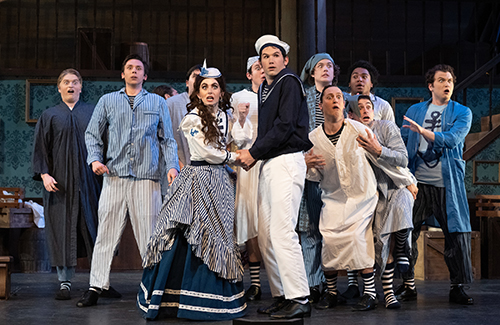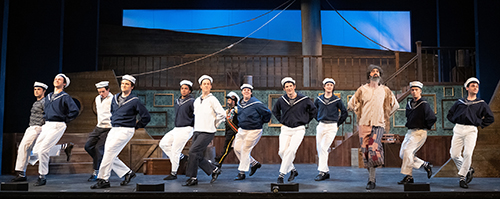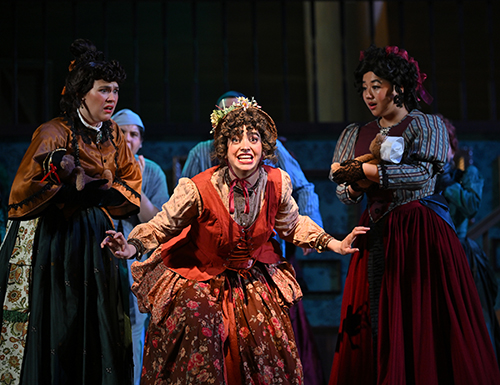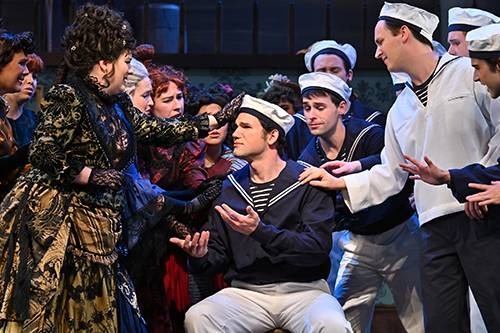by Daniel Hathaway
It’s been a good thing for the creative team of W.S. Gilbert and Arthur Seymour Sullivan that Victorian England was rife with unqualified public officials, rigid class distinctions, and social inequality. What would the plot of H.M.S. Pinafore, one of their most popular Savoy Operas, have been like without the opportunity to lampoon such functionaries as W. H. Smith, a politician with no nautical experience, by portraying him as Sir Joseph Porter, the First Lord of the Admiralty? His advice:
Now landsmen all, whoever you may be,
If you want to rise to the top of the tree,
If your soul isn’t fettered to an office stool,
Be careful to be guided by this golden rule.
Stick close to your desks and never go to sea,
And you all may be rulers of the Queen’s Navee!
Or without the chance to comment on the love between Ralph Rackstraw and Sir Joseph Porter’s daughter Josephine while exposing the hypocrisy of Captain Corcoran’s assertion that love conquers all:
Never mind the why and wherefore,
Love can level ranks, and therefore,
Though his lordship’s station’s mighty,
Though stupendous be his brain,
Though her tastes are mean and flighty
And her fortune poor and plain.
On June 29, Ohio Light Opera, originally formed as a Gilbert & Sullivan company, broke champagne over the bow of the H.M.S. Pinafore for the seventeenth time, making the show their most frequently performed work in the G&S Canon with more than 130 performances over the last 43 seasons. In this case, familiarity has bred only affection. The show has lost none of its luster in the current iteration, which is both directed and choreographed by Spencer Reese, with Wilson Southerland crisply conducting the OLO Orchestra. The cast is vocally impressive, especially the mellifluous male chorus.
One new thing this time around: the tradition of bringing the audience to its feet before the opening curtain to engage in a mild act of sedition by swearing fealty to the British monarch was continued this time by singing God Save the King in honor of Charles III.
The attractive set by Chyna Mayer — the foredeck of the Pinafore (“Our saucy ship’s a beauty”) fitted out with empty picture frames as portholes — served for both acts, and trap doors allowed actors to pop up whack-a-mole fashion. Nautical costumes for the crew and Victorian garb for the landlubbers by Newman Jones set the historical context nicely.
We meet all those characters at the top of the morning in the cheerful sailors’ song “We sail the ocean blue,” in Corcoran’s confessional aria “I am the Captain of the Pinafore,” and in Sir Joseph’s autobiographical patter songs “I am the Monarch of the Sea” and “When I was a lad,” as well as making the acquaintance of the Portsmouth bumboat woman Little Buttercup and her wares.
In addition to their vocal prowess, the sailors are a wholesome company — “sober men and true” — and Captain Corcoran (Jacob Allen) their worthy leader is “hardly ever sick at sea.” Festooned with medals and nearly consumed by facial hair, Sir Joseph (Vincent Gover) relates his rise to power with admirable candor and crisp diction. Cousin Hebe (Margaret Langhorne) introduces Sir Joseph’s sisters and cousins (“Who he reckons by the dozens, and his aunts”), and Tzytie Steinman, a tall, operatic soprano, makes her appearance as Little Buttercup, bearing a surprisingly modest handbasket, considering the extent of the wares she offers:
I’ve snuff and tobaccy, and excellent jacky,
I’ve scissors, and watches, and knives;
I’ve ribbons and laces to set off the faces
Of pretty young sweethearts and wives.
I’ve treacle and toffee, I’ve tea and I’ve coffee,
Soft tommy and succulent chops;
I’ve chickens and conies, and pretty polonies,
And excellent peppermint drops.
But the central characters in this nautical drama are Ralph Rackstraw (the fresh-faced Benjamin Rorabaugh) and the lovely Josephine (Sarah Lucille Law), who eventually come to the conclusion that they’re in love with each other and that love indeed conquers all. They conspire with the ship’s crew to sneak ashore under cover of darkness to be married.
That doesn’t turn out to be so simple. Dick Deadeye (Charles Austin Piper), whose every appearance onstage is greeted by he-who-must-not-be-named shivers of dread from everyone, leaks the news to the Captain, and Ralph ends up in the brig. A typically British plot twist is introduced by Buttercup, who melodramatically narrates a secret:
A many years ago when I was young and charming,
As some of you may know, I practiced baby-farming.
Two tender babes I nursed: one was of low condition,
The other a patrician, a many years ago.
In time each little waif forsook his foster-mother,
The well born babe was Ralph —
Your captain was the other.
Before that, Sir Joseph, Corcoran, and Josephine join in a festive chorus, “Never Mind the Why or Wherefore,” that mentions “merry bells” and uses increasingly large ones as props. This gets funnier and funnier with each reprise until Sir Joseph’s head ends up inside a huge bell struck by an enormous hammer.
Ring the merry bells on board-ship,
Rend the air with warbling wild,
For the union of his/my lordship
With a humble captain’s child!
Captain: For a humble captain’s daughter —
Josephine: For a gallant captain’s daughter —
Sir Joseph: And a lord who rules the water —
Josephine: (aside) And a tar who ploughs the water!
All: Let the air with joy be laden,
Rend with songs the air above,
For the union of a maiden
With the man who owns her love!
The fourteen Savoy Operas are the result of the unlikely collaboration between a sharp-witted social critic and an eminent Victorian — who also composed Onward, Christian Soldiers and The Lost Chord. Safely navigating such a production between the hazards of biting satire and cloying sentimentality requires a steady hand on the wheel, and this afternoon, director and choreographer Spencer Reese took H.M.S. Pinafore out for a delightfully dramatic voyage and returned it safely to Portsmouth. No Savoyard went overboard.
The production runs in repertory in Freedlander Theatre at The College of Wooster through July 28.
Published on ClevelandClassical.com July 6, 2023, Revised July 7.
Click here for a printable copy of this article






